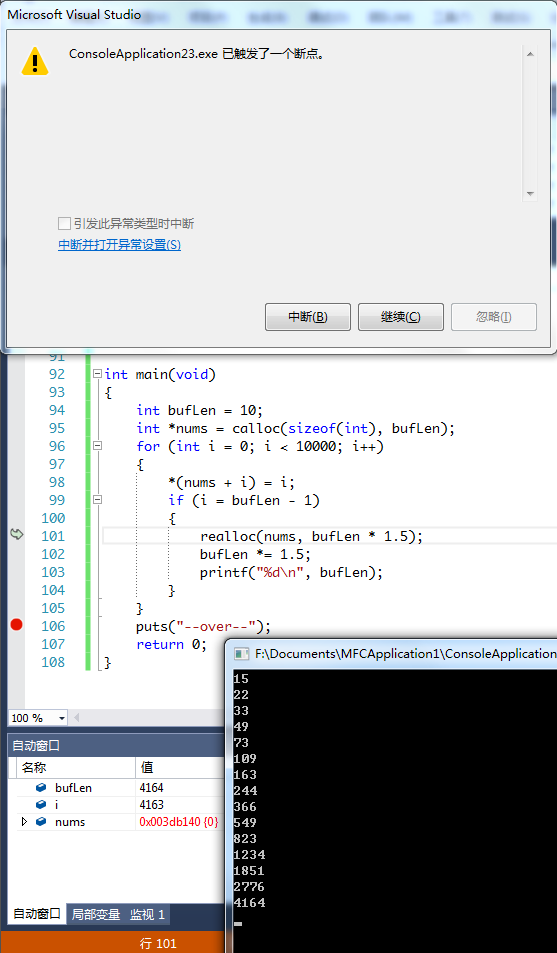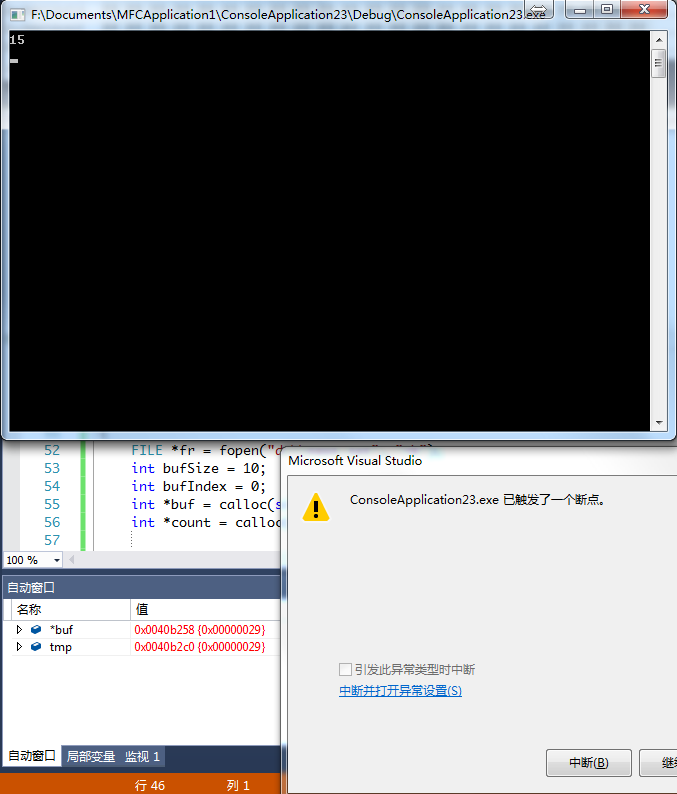70,026
社区成员
 发帖
发帖 与我相关
与我相关 我的任务
我的任务 分享
分享
#include <stdio.h>
#include <stdlib.h>
#include <string.h>
#pragma warning(disable:4996)
int main(void)
{
int bufLen = 10;
int *nums = calloc(sizeof(int), bufLen);
for (int i = 0; i < 10000; i++)
{
*(nums + i) = i;
if (i == bufLen - 1)
{
realloc(nums, bufLen * 1.5);
bufLen *= 1.5;
printf("%d\n", bufLen);
}
}
puts("--over--");
return 0;
}

#include <stdio.h>
#include <stdlib.h>
#include <string.h>
#pragma warning(disable:4996)
void myRealloc(int **buf, int oldsize, int newsize)
{
int *tmp = calloc(sizeof(int), newsize);
for (int i = 0; i < oldsize; i++)
{
*(tmp + i) = *(*buf + i);
}
free(*buf);
*buf = tmp;
}
int main(void)
{
FILE *fr = fopen("d:\\test.txt", "rb");
int bufSize = 10;
int bufIndex = 0;
int *buf = calloc(sizeof(int), bufSize);
int *count = calloc(sizeof(int), bufSize);
while (!feof(fr))
{
int tmp = 0;
fscanf(fr, "%d", &tmp);
int index = getBufIndex(buf, bufSize, tmp);
if (index == -1)
{
*(buf + bufIndex) = tmp;
*(count + bufIndex) += 1;
bufIndex++;
if (bufIndex == bufSize)
{
bufSize *= 1.5;
myRealloc(&buf, bufSize, bufSize);
printf("%d\n", bufSize);
}
}
else
{
*(buf + index) = tmp;
*(count + index) += 1;
}
}
free(buf);
free(count);
puts("over");
return 0;
}

//文件1中的内容排序并去重,结果保存到文件2中
#include <stdio.h>
#include <stdlib.h>
#include <string.h>
#define MAXCHARS 128 //能处理的最大行宽,包括行尾的\n和字符串尾的\0
int MAXLINES=10000,MAXLINES2;
char *buf,*buf2;
int c,n,hh,i,L;
FILE *f;
char ln[MAXCHARS];
int ignore_case=0;
int icompare(const void *arg1,const void *arg2) {
return stricmp((char *)arg1,(char *)arg2);
}
int compare(const void *arg1,const void *arg2) {
return strcmp((char *)arg1,(char *)arg2);
}
int main(int argc,char **argv) {
if (argc<3) {
printf("Unique line. Designed by zhao4zhong1@163.com. 2012-08-20\n");
printf("Usage: %s src.txt uniqued.txt [-i]\n",argv[0]);
return 1;
}
if (argc>3) ignore_case=1;//若存在命令行参数3,忽略大小写
f=fopen(argv[1],"r");
if (NULL==f) {
printf("Can not find file %s!\n",argv[1]);
return 1;
}
buf=(char *)malloc(MAXLINES*MAXCHARS);
if (NULL==buf) {
fclose(f);
printf("Can not malloc(%d LINES*%d CHARS)!\n",MAXLINES,MAXCHARS);
return 2;
}
n=0;
hh=0;
i=0;
while (1) {
if (NULL==fgets(ln,MAXCHARS,f)) break;//
hh++;
L=strlen(ln)-1;
if ('\n'!=ln[L]) {//超长行忽略后面内容
printf("%s Line %d too long(>%d),spilth ignored.\n",argv[1],hh,MAXCHARS);
while (1) {
c=fgetc(f);
if ('\n'==c || EOF==c) break;//
}
}
while (1) {//去掉行尾的'\n'和空格
if ('\n'==ln[L] || ' '==ln[L]) {
ln[L]=0;
L--;
if (L<0) break;//
} else break;//
}
if (L>=0) {
strcpy(buf+i,ln);i+=MAXCHARS;
n++;
if (n>=MAXLINES) {
MAXLINES2=MAXLINES*2;
if (MAXLINES2==1280000) MAXLINES2=2500000;
buf2=(char *)realloc(buf,MAXLINES2*MAXCHARS);
if (NULL==buf2) {
printf("Can not malloc(%d LINES*%d CHARS)!\n",MAXLINES2,MAXCHARS);
printf("WARNING: Lines >%d ignored.\n",MAXLINES);
break;//
}
buf=buf2;
MAXLINES=MAXLINES2;
}
}
}
fclose(f);
if (n>1) {
if (ignore_case) qsort(buf,n,MAXCHARS,icompare);
else qsort(buf,n,MAXCHARS,compare);
}
f=fopen(argv[2],"w");
if (NULL==f) {
free(buf);
printf("Can not create file %s!\n",argv[2]);
return 2;
}
fprintf(f,"%s\n",buf);
if (n>1) {
if (ignore_case) {
hh=0;
L=MAXCHARS;
for (i=1;i<n;i++) {
if (stricmp((const char *)buf+hh,(const char *)buf+L)) {
fprintf(f,"%s\n",buf+L);
}
hh=L;
L+=MAXCHARS;
}
} else {
hh=0;
L=MAXCHARS;
for (i=1;i<n;i++) {
if ( strcmp((const char *)buf+hh,(const char *)buf+L)) {
fprintf(f,"%s\n",buf+L);
}
hh=L;
L+=MAXCHARS;
}
}
}
fclose(f);
free(buf);
return 0;
}
myRealloc(&buf, bufSize, bufSize); #include <stdio.h>
#include <stdlib.h>
#include <string.h>
#pragma warning(disable:4996)
void myRealloc(int **buf, int oldsize, int newsize)
{
int *tmp = (int *)calloc(sizeof(int), newsize);
for (int i = 0; i < oldsize; i++)
{
*(tmp + i) = *(*buf + i);
}
free(*buf);
*buf = tmp;
}
int main(void)
{
FILE *fr = fopen("d:\\test.txt", "rb");
int bufSize = 10;
int bufIndex = 0;
int *buf = (int *)calloc(sizeof(int), bufSize);
int *count = (int *)calloc(sizeof(int), bufSize);
while (!feof(fr))
{
int tmp = 0;
fscanf(fr, "%d", &tmp);
int index = getBufIndex(buf, bufSize, tmp);
if (index == -1)
{
*(buf + bufIndex) = tmp;
*(count + bufIndex) += 1;
bufIndex++;
if (bufIndex == bufSize)
{
//bufSize *= 1.5; /*del */
myRealloc(&buf, bufSize, bufSize * 1.5); /*old and new*/
printf("%d\n", bufSize);
}
}
else
{
*(buf + index) = tmp;
*(count + index) += 1;
}
}
free(buf);
free(count);
puts("over");
return 0;
}#include <stdio.h>
#include <stdlib.h>
#include <string.h>
#pragma warning(disable:4996)
int main(void)
{
int bufLen = 10;
int *nums = calloc(sizeof(int), bufLen);
for (int i = 0; i < 10000; i++)
{
*(nums + i) = i;
if (i == bufLen - 1)
{
realloc(nums, bufLen * 1.5);
bufLen *= 1.5;
printf("%d\n", bufLen);
}
}
puts("--over--");
return 0;
}#include <stdio.h>
#include <stdlib.h>
#include <string.h>
#pragma warning(disable:4996)
int main(void)
{
int i;
int bufLen = 10;
//int *nums = calloc(sizeof(int), bufLen);
int *nums = (int *)calloc(bufLen , sizeof(int));
for (i = 0; i < 10000; i++) {
*(nums + i) = i;
printf("i = %d\n", i);
if (i == bufLen - 1) {
nums = (int *) realloc(nums, bufLen * sizeof(int) * 1.5);
if (!nums) {
fprintf(stdout, "realloc error!\n");
exit(-1);
}
bufLen *= 1.5;
printf("bufLen = %d\n", bufLen);
}
}
puts("--over--");
return 0;
}